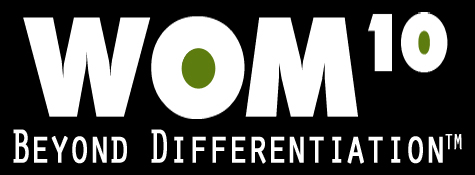 Language is critically important when ANY EMPLOYEE interacts with your customer…if the customer doesn’t understand it, they leave. And they don’t tell anyone else about you…at least nothing positive. The LANGUAGE I am talking about is your “customer language”…what they hear you saying and what they interpret your words to mean to them.
Language is critically important when ANY EMPLOYEE interacts with your customer…if the customer doesn’t understand it, they leave. And they don’t tell anyone else about you…at least nothing positive. The LANGUAGE I am talking about is your “customer language”…what they hear you saying and what they interpret your words to mean to them.
When I talk to customers and get feedback on a business, one of the most frequent comments I get back is, “I don’t really understand what they are saying so sometimes it’s hard to make a decision to buy.” What this is really saying is that we aren’t communicating in “customer language”…the language our customers understand. And it isn’t rocket science to figure out that when someone doesn’t understand what you are saying, they will have a very hard time justifying why they should buy from you.
One thing I have observed from being a Strategic Advisor and Consultant to business leaders over the years is that if it’s too complicated or convoluted, they abort…they just stall until you go away. I learned this early on in my career when I was at Arthur Andersen. I specifically remember a particular presentation our team was giving to a $100M manufacturing company Owner and his team.
It was for a sizable project that would engage us for at least a year to help them rebuild their business strategy, get closer to their customers, and improve their business processes…an ideal project. We had lots of really detailed presentation slides (very different from what I present today) and PowerPoint was smoking that afternoon. Everyone was on their game and presented what they could contribute and how they fulfill their role to help the company.
At the end of the presentation, I asked the Business Owner what he thought. What he said changed my life that day and changed the way I vowed to operate going forward. It was one of those guiding principles I follow to this day because it is so “spot on” and accurate. He said to us…
“Thank you for the presentation, I can see you went to a lot of work putting all this together for us. I have just two comments for you right now that we might want to think about a bit more before we make any decisions. I only understood about 20% of what you said and I consider myself to be a pretty smart guy. You were speaking in a ‘language’ I didn’t really understand through most of the presentation. It looked impressive and very technical so I presume you know what you are doing, but I didn’t get it. My second comment is pretty simple…it looks really expensive. And since I didn’t really understand most of it, it is hard for me to determine if this is an appropriate fee or not. Perhaps we can translate this into something I can understand and we can revisit it again. I like things ‘dirt simple’ and find that when I get things to that level, my customers really understand what I can do for them. Maybe we can try this again after you have applied the ‘dirt simple’ test to your information.”
WOW…shot down because of one simple issue…LANGUAGE. He didn’t get it…he didn’t understand the words, terms, or how it was being put together to help him and his business. We weren’t communicating in a language he understood so he couldn’t effectively analyze the proposal and the fees. He was completely accurate and it hit me like a punch in the stomach. He was right…and I knew it right after he said it to me and the team. We came back with a much more straight forward presentation…about half the PowerPoint slides and really easy to understand. I still don’t think it was “dirt simple” in hindsight but considerably better. He hired us…and I won’t ever forget that moment.
Today I live by the “dirt simple” rule. He taught me then what I have heard and seen a hundred times or more when talking to business leaders…if it isn’t in my LANGUAGE then I can’t understand it and translate it to my business. When I talk to leaders, they tell me they reject the majority of proposals because they just seem “too complex and complicated” for what they want to do in their business…they simply don’t understand them well enough to commit funds and resources.
It isn’t that the consultants (or employees) aren’t good at what they do…they are usually very qualified…they just can’t translate what they do into the language of their customers. So they get rejected for reasons they never understand…reasons such as price, timing, and other nonsensical issues. They had a great solution…the customer just didn’t understand it or what they were really saying.
You might be asking why they don’t ask the consultants to clarify what they are saying since they don’t fully understand it…they don’t. And the biggest reason is because no one wants to look stupid…like they don’t get it. No one wants to ask the “dumb question” (we learned this early on in school). People like to look like they get it and are smart. If they ask a simple question like, “I don’t get it, can you explain it again,” it would be make them appear as it they weren’t as smart as the consultant thinks they are…so they just come up with some reason to reject it until they can find someone who can explain it in simpler terms.
I share this story so you can translate it to your own business…your own customers. Ask yourself (and your teams) if you are making the same mistake I did 20 years ago…sounding so sophisticated, complex, and knowledgeable so they would hire me because of these reasons. They don’t…they want your message in their language and “dirt simple” so they can translate it easily. If you follow the path of complexity the customer doesn’t translate all the wonderful things you can do for them…they will not understand the language you are using.
It’s like speaking French when your customer speaks English. They will only understand a few things and will ignore the rest…usually the best parts. Figure out the “language” of your customers and how you need to communicate so you are both speaking the same language. Test it out early on…share some insights and stories and see if they respond favorably. ASK THEM key questions and listen to both what and how they are sharing their answers. Ask more and LISTEN MORE and you will begin to hear the “language” they use and how they want you to present all the wonderful things you can do to help them.
Incorporate this “language” and approach into everything you do and discuss it with them. If you communicate in their language, you will learn more than any of your competitors. And when you know more about your customers…the deep and good stuff…you win. Having this depth of information and how to speak their “language” gets you into the secret passages others can’t reach. Whether you are in a transaction retail business or a sophisticated B2B organization, this works and helps you differentiate. It helps you create a much stronger customer experience because they feel like you are truly OBSESSING OVER YOUR CUSTOMERS since you are willing to listen and learn. This makes you and your company something special to them and someone they want to do business with…and they tell others!
